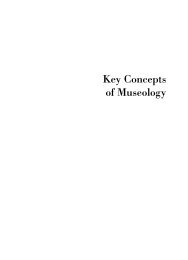ISS 25 (1995).pdf - The International Council of Museums
ISS 25 (1995).pdf - The International Council of Museums
ISS 25 (1995).pdf - The International Council of Museums
You also want an ePaper? Increase the reach of your titles
YUMPU automatically turns print PDFs into web optimized ePapers that Google loves.
Given the fact that museums have an important place in cultural history, but they<br />
are also critical places for the politics <strong>of</strong> history6, should they leave the cultural<br />
and political agendas to shape the body <strong>of</strong> matters they study?<br />
<strong>Museums</strong> are expected to provide education, spectacle, entertainment, relief. In their long<br />
history, coping with issues and dilemmas has been an inspiring challenge for them. Amost<br />
characteristic example has been their response to the political and intellectual turmoil <strong>of</strong><br />
late 1960's in France, through the development <strong>of</strong> the ecomuseum movement, which has<br />
opened new paths in museologicalthinking.<br />
<strong>The</strong> present-day situation demands from museum pr<strong>of</strong>essionals a self-conscious reflection<br />
over the very essence <strong>of</strong> their role, shaping eventually their own specific "identity" and<br />
reconsidering their performance as mediators and/or as facilitators. A fresh look at the<br />
job would lead to the consideration that risk-taking and confrontation, as well as shifting<br />
from monologue to conversation, is probably a "sine qua non" parameter, if ever the<br />
accomplishment <strong>of</strong> the democratic goals <strong>of</strong> presenting the contemporary social diversity<br />
and multiculturalism is to take place.<br />
Realizing though the political implications that exhibitions might cause, a careful<br />
treatment <strong>of</strong> key notions like what is good and bad, superior and inferior, differences<br />
and similarities, can be <strong>of</strong> positive consequence, given the influence <strong>of</strong> museums as<br />
valorizing institutions.<br />
Equally effective could be a strategy <strong>of</strong> avoiding any paternalistic manner in approaching<br />
subjects i.e with the aim to guide the public towards conclusions which serve political<br />
goals.<br />
In this same context can be inscribed the striving for consensus and the exclusion <strong>of</strong> any<br />
imposition <strong>of</strong> identity, as well as the abstention from overditerminated views.<br />
24
















